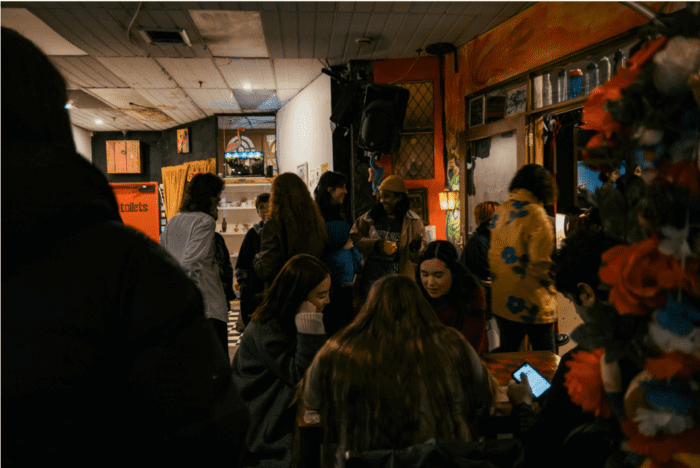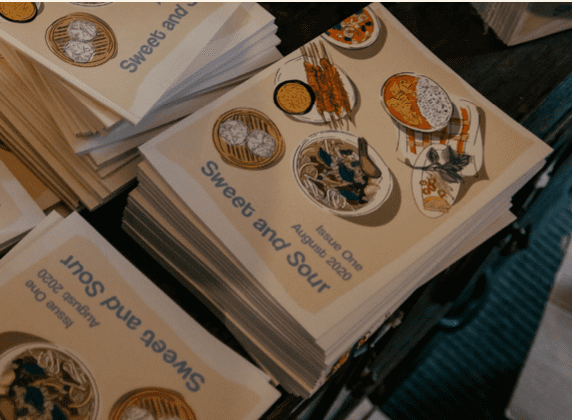The Sweet and Sour Zine (SNS) was conceived in the middle of isolation by founder Sydney Farey. As COVID-19 spread across the world, along with it came a rise in xenophobia catalysed by the pandemic. Without everyday physical interactions and our usual support networks, people begin to lose a sense of community. That’s what inspired Sydney to post in ANU Facebook groups in search of a like-minded team to found SNS. After an overwhelming amount of submissions from the community (thank you!) and a lot of hard work from everyone on the team, Issue One of the zine was successfully launched on the 8th of August at Smith’s Alternative. What was a wet and cold day outside, could not stop the merriment and buzz of excitement that filled Smith’s that afternoon. As we are bi-monthly, sending in content for us to print is a way you can support us! Look out for Issue Two submission openings soon!
Following is an interview with Sydney Farey and some responses from SNS team members discussing the zine and its significance.
–Viv Wang
Founder Sydney Farey:
About you:
I consider myself a visual artist and art historian. I work mostly in printmaking, and in ceramics more recently. I was born and raised in China, moving to Canberra when I was twelve years old. My identity is a mix between my Chinese upbringing, my American family, and my life growing up in Australia.
What inspired you to found SNS?
I wanted to create a space for individuals with Asian heritage in Australia to share our thoughts, experiences and creativity, and provide a supportive platform where we can come together to explore our cultures, connect and heal. It is a powerful feeling when we realise we are not alone and many of our experiences are shared with others.
What has the reception been like thus far?
The reception has been overwhelmingly positive! From our dedicated executive team members and contributors, to the people who share our social pages and send us encouraging messages – we have been met with nothing but support from the Canberra, and greater Australia community. It goes to show how important a platform like SNS is, especially during tumultuous times like these. Our community is growing bigger and bigger every day.
On Aug 8 launch event, our FB page surpassed 600 likes, and our IG page surpassed 300 likes. Most online traction came from our Smith’s event at over 9.5k interactions. We had over 50 contributions to the first issue of the zine from all over Australia.
What do you hope SNS will be able to achieve?
I hope SNS can keep providing opportunities for Asian creators to develop and share their work in a supportive and creative environment, and continue educating the broader public through bringing attention to Asian stories and experiences. While most of our team and our community is based in Canberra at the moment, I hope SNS will keep growing and reach areas all around Australia.
How can others support BIPOC creators/SNS?
While we were able to keep the first issue of SNS free as we received SEEF funding, our future issues may require a small charge in order to sustain printing fees and keep this platform alive. We will always try to keep SNS as accessible as possible, with free issues online at all times. The best way to directly support BIPOC artists is to do it locally! Attend BIPOC artists’ exhibitions, plays, shows, live sets, purchase locally produced art, clothing, crafts and objects from BIPOC creators.
The Sweet and Sour Team:
What motivated you to join the SNS team?
Chetan Kharbanda (Management): Race and culture takes up a huge chunk of my headspace as a POC living in Australia. Being an extroverted and super social person, I feel very connected to my peer group which constitutes people from all sorts of backgrounds. Despite this, I’ve always struggled to share some thoughts, ideas and experiences effectively due to a huge difference in personal context. When I saw Sydney’s post about a potential venture which will facilitate sharing the voices of the BIPOC community, the first thought that hit me was “Hell yeah!!”.
What do you hope SNS will be able to achieve?
Viv Wang (Marketing): I hope SNS will become a popularised space where Asian creators feel safe and appreciated. I see SNS as an important tool in cross-cultural understanding as it provides a platform for creators categorically deemed as niche to publish their work.
How do you think SNS will impact Asians in Australia?
James Yang (Design): I think it will be a good way to attract more attention to the Asian-Australian experience, as I think it is something that is often deemed insignificant, or pushed to the side in light of other social issues.
Viv Wang (Marketing): I think the massive turnout and the really enthusiastic reception we’ve gotten so far speaks volumes about how such a project was needed. I believe SNS will assist in the popularisation and spotlighting of the wide varieties of Asian-Australian experiences which may help in the validation of other Asian Australians.
How can others support BIPOC creators/SNS?
Chetan Kharbanda (Management): I’d say follow the three E’s. Educate yourself, Empathise and Enact the change. We’re here to help you do that.

Photographer: Abby Ching
Think your name would look good in print? Woroni is always open for submissions. Email write@woroni.com.au with a pitch or draft. You can find more info on submitting here.
We acknowledge the Ngunnawal and Ngambri people, who are the Traditional Custodians of the land on which Woroni, Woroni Radio and Woroni TV are created, edited, published, printed and distributed. We pay our respects to Elders past and present. We acknowledge that the name Woroni was taken from the Wadi Wadi Nation without permission, and we are striving to do better for future reconciliation.
